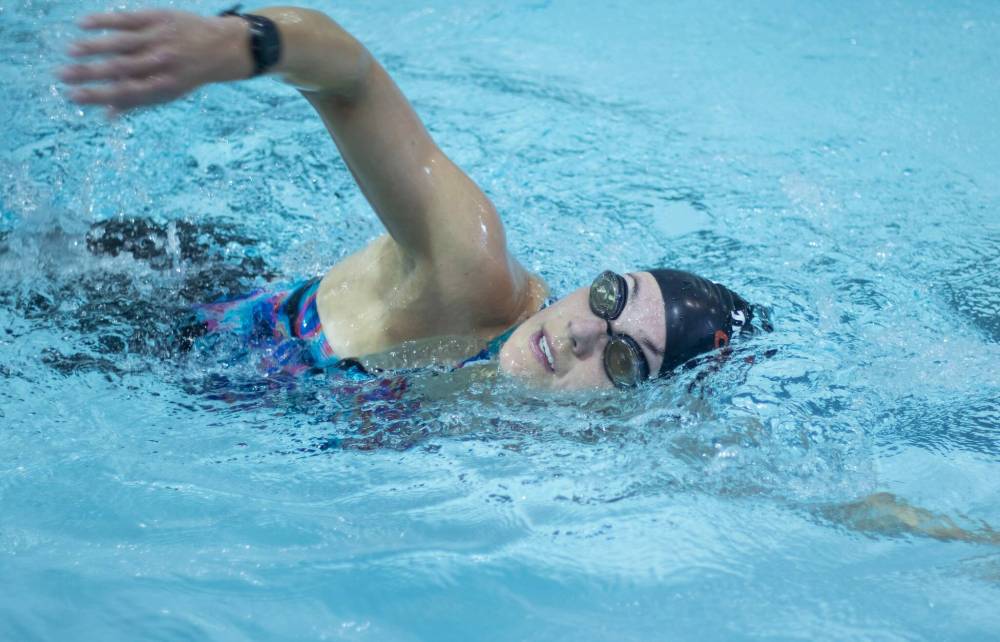
FIVE years ago Leanne Taylor underwent surgery to stabilize her spinal cord after a bicycle accident.
Today she is the third-ranked para-triathlete in the world with her eyes set on the 2024 Paralympic Games in Paris.
Taylor did not think much of her accident when it happened in 2018.

Para-triathlete Leanne Taylor works out at the Pan-Am Pool. (Mike Thiessen / Winnipeg Free Press)
“It was sort of one of those accidents where you wouldn’t expect the outcome,” said Taylor. “I was riding on the trail and pulled the brake wrong I suppose and went over the handlebars. It seemed like a low-impact accident, there was actually a family physician who was biking by and he saw the accident and he said that he didn’t think that I would be seriously injured from what he had seen.”
The situation became far more serious when Taylor began losing feeling in her legs. Coincidentally her fiance, Scott Dyck, had just finished his PhD on spinal cord injury research which provided the couple with a wealth of knowledge about the exact situation they found themselves in. Dyck called 911 and they were sent to the Health Sciences Centre where Taylor was told she had a spinal cord injury. Taylor processed the devastating news quite well given the circumstances.
“I think what helped me process it a little bit is that we had background understanding and weren’t entirely surprised to be told that,” said Taylor.
After undergoing surgery to stabilise her spine, doctors were hopeful that she would regain feeling in her legs.
“They thought that I might regain some function. So the first few days after the accident the doctor was coming in often and doing neuro-assessments to see whether I did regain some function, but I didn’t, so here we are.”
While in hospital, Taylor was asked if she had any interest in paralympic sports.
“There was a recreation therapist at HSC who had offered to take me to the track to see a para-athlete, Colin Mathieson, training on the track,” said Taylor. Taylor went with the intention of only watching, but Mathieson had a second racing chair and encouraged her to give it a try.
“I tried a couple laps and I was just so into it, it was so much fun,” said Taylor. “From there, my sister and I started Googling para-sports and what was available, like what sports are in the paralympics for wheelchair users and what’s available and we found para-triathlon.”
Taylor quickly got into contact with the para-triathlon national team coach, Carolyn Murray.
Murray encouraged Taylor to get classified to compete in para-triathlon. In order to compete and train with a national team, para-athletes must attend a classification event where they participate in a race and officials put the para-athletes into groups who have similar disabilities.
Taylor obliged and went to a race in Sarasota, Fla., where she was classified and her journey in para-triathlon began.
The para-triathlon for Taylor involves a 750 metre open-water swim, 20-kilometre cycle where competitors use a hand cycle and a five kilometre-run in a racing wheelchair. Murray sends Taylor a training program for the biking and running parts of the event, but Taylor’s training for the open water swim is overseen by Norman Carriere, who works with her three times a week in Winnipeg.
Carriere and Taylor rely heavily on scientific data to decide her training program.
“We’re both engaged in the science of it,” said Carriere. “I’m driven by data and she knows this, she looks up and says ‘what are those numbers?’ and I give her numbers back about her distance per stroke, her stroke rate… those kinds of things are really important.”
This approach works well for Taylor, who enjoys looking at her training through a scientific lens.
“For the most part, I have treated sport like a science experiment, you know the data says if you do this, this might happen and if you do it this way, you’re going to be faster,” she said.
While she does much of her training in Winnipeg, Taylor does fly to Victoria a few times a year to train with Murray and fellow triathletes. One of her training partners is Jessica Tuomela, who was blinded by retinoblastoma at the age of three. The two athletes are not in the same classification for the triathlon but train together when Taylor is in Victoria. Tuomela always looks forward to their time together.
“She’s just warm and thoughtful and I love it because we can get into some really interesting discussions,” said Tuomela. “She just really enriches our environment, whether we’re training or whether we’re all just hanging out in my living room and one of my dogs is squishing her.”
Taylor will look to qualify for the 2024 Paralympic games in Paris. She currently ranks third in the world, but the qualification process for the Paralympics only factors in qualifying race results from the year before the Games. The top 9 ranked athletes in the world will be invited based on their three best finishes in qualification races. Taylor’s qualification journey begins on home soil, as she will race on July 8 in Montreal. The timing is special for Taylor as it will mark five years since her accident.
“It will actually be my five-year anniversary of my spinal cord injury. I think it’s so exciting to have that line up in that way, that five years post-injury I will be trying to qualify for the games. I’m pretty pumped.”


